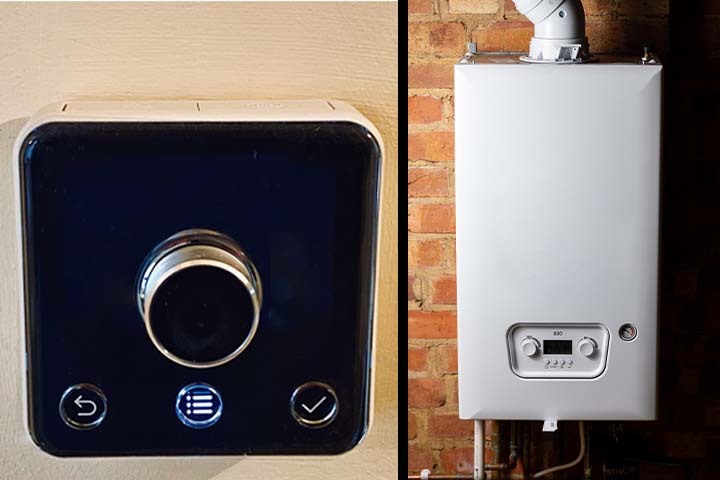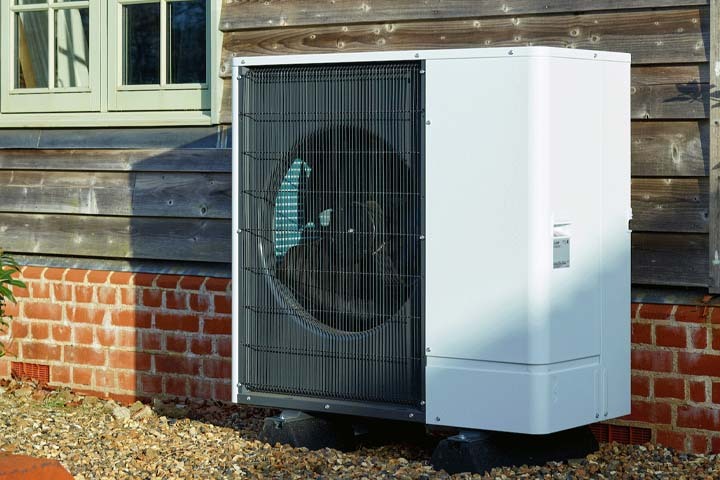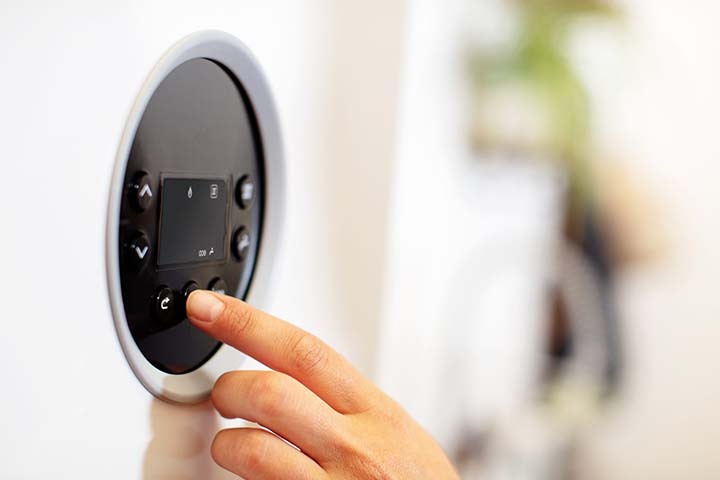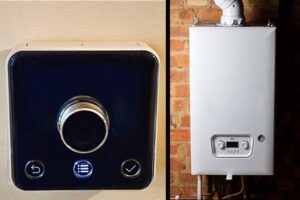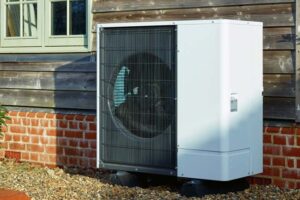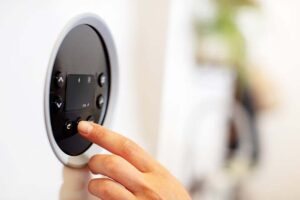Table of Contents
Do you ever wish to know how much it will cost running an air source heat pump? Indeed, many homeowners want energy-efficient heating and cooling solutions, so the costs incurred operating these systems are of utmost importance. Reduce your carbon footprint and save on energy expenses through using air source heat pumps. So exactly how much does one cost per hour?
Well, in this article, we break everything you need to know-from factors influencing running costs to some handy tips on keeping those expenses under control. So, let’s dive into the world of heat pumps and find out what actually makes them such a smart investment for your home!
Heat Pumps and Their Benefits
Heat pumps are the latest systems that have taken out heat from one location and transferred it to another, providing heating and cooling effects within a house. They don’t produce any heat like other furnaces do; they bring out what is there and move it along. This is why they are so efficient.
The advantage of an air source heat pump is flexibility in that it can keep your house warm for winter months and cool for summer months.
The ASHP systems are also very appealing due to their environmental consciousness. This way, they drastically reduce greenhouse gas emissions compared to conventional heating methods since they use renewable energy sources.
Other than saving the environment, many homeowners in the UK can expect to spend much less on utilities as an indirect effect of the installation of heat pumps. Provided proper installation and care, you might not constantly be afraid of overspending every month.
Factors that Affect the Cost of Running a Heat Pump
A number of factors determine the cost of maintaining a heat pump. A very important point is that the bigger the house, the more energy may be required to comfort, warm-up or cool down the premises.
Climate also has a role in the matter. There are times that, owing to cold climes, heat pumps work hard during winter, which means consumption of energy would be increased, and subsequently, so will be the energy and heat pump cost.
Efficiency rating of the unit also matters. Generally, the higher-rated model will consume more wattage with sufficient heating or cooling.
Local electricity rates also affect your individual calculation of your bill. The variability in such rates alters the effective per-hour operating cost of the power system.
Over the operating life, maintenance practices determine the performance and efficiency. Regular maintenance assures maximum performance and operation, thereby eventually reducing operating costs over its life.
Calculating the Average Cost of Running a Heat Pump per Hour
An air source heat pump of 2.2 kW produces approximately 11kw worth of hot water for use in radiators and takes 2200 watts from the mains. At 22.36p per Kwh (and based on average prices under the Energy Price Cap as from July 2024), running this system would be around 49p per hour in electricity, or £3.92 for an 8 hour running period.
However, a much greater central system would consume about 11kw and would be much more expensive, costing near £2.46 per hour to run but that will generate enough heat to warm an average-sized house of three bedrooms.
Keep in mind also that efficiency enters the picture here. A well-rated heat pump may produce more heating or cooling output than its electrical input would indicate, working to your advantage over the long run. Regular maintenance also ensures optimum performance, which can help keep those bills lower as well.
Tips for Reducing the Cost of Running a Heat Pump
In order to minimise the cost of running your heat pump, maintenance ranks in at the top as the utmost priority. Air flow should be maintained by cleaning or replacing filters every few months to ensure optimal efficiency.
Install a programmable thermostat. It allows one to be able to fine-tune settings for schedules, and they will save energy because you are away from home.
Insulation is also of good importance. Make sure that your house is very well-insulated so that the desired temperature is stable. That minimises the workload of your heat pump, hence saves you some costs.
Make use of your off-peak electricity tariffs if you can avail yourself of it. Off-peak tariffs will hugely save you in terms of energy.
Add some simple weather-stripping so your doors and windows have the best seal against any drafts. For just keeping up indoor temperatures without overworking your system, it’s going to make all the difference.
Comparing Costs: Heat Pump vs. Other Heating and Cooling Systems
Indeed, when one measures the efficiency of heating and cooling options, heat pumps stand out by their efficiency. Unlike traditional systems that produce heat or cool air, heat pumps transfer energy. Often, this leads to lower operational costs.
Comparatively, gas furnaces and electric heaters can be more costly in terms of monthly expenditure through fuel prices. They require the burning of fossil fuel or the use of resistive heating which is not so efficient.
Central air systems also guzzle electricity during peak summer months. The bottom line is that heat pumps conserve energy while keeping comfort throughout the year.
Though investment in a heat pump bill estimate may become costlier at the initial stages than some of the conventional systems, their utility bill savings in the longer run pay back more than the expenditure; therefore they are so attractive to most homeowners who are eager for sustainability along with budgetary facilitation.
System | Installation Cost | Operating Cost | Efficiency | Maintenance Cost |
Heat Pump | Higher | Lower | High | Moderate |
Furnace | Lower | Higher | Moderate | Moderate |
Boiler | Higher | Moderate | High | Higher |
Window AC | Lower | Higher | Low | Low |
Central AC | Higher | Higher | Moderate | Moderate |
Various Factors that Impact the Running Cost
It is relatively pricey to operate a heat pump, depending on several key factors. One of the most important determining factors will be the size and efficiency rating of the unit itself. It often takes less energy to get to any given temperature with larger, high-efficiency models.
Climate plays a very important role also. In colder climates, heat pumps will have to work harder during the winter months, and thus the running costs may be more considerable. In a milder climate, however, they operate constantly through the year in a more efficient manner.
Quality of installation. A bad installation of a system may lead to air leaks or flawed performance, increasing energy consumption and bills.
Maintenance practices also keep running costs low. Regular servicing ensures that equipment is operating at its best and lasts much longer, avoiding surprise repairs that may inflate costs later.
Running Cost of Heat Pumps Per Hour
A heat pump’s running cost per hour can vary significantly. In general, however, these appliances tend to be energy-saving. In many cases, they will consume far less energy than their equivalents.
However, generally you could expect to pay anything from £0.05 per hour to run the heat pump in the UK to £0.10 an hour, which is significantly less than the running cost of the gas boiler, up to £0.20 per hour.
A well-maintained air source heat pump will typically operate with better efficiency in milder weather conditions. At places that still can be cold, its performance might be reduced and cost may also be high.
Understanding how much a particular unit in your home uses energy can be critical to avoiding the dangers of inaccurate budgeting. Regular analysis will help assess what those unexpected spikes in consumption might mean to you in terms of maintenance or inefficiencies.
Economical Maintenance Keeping track of local utility rates is also useful to provide an estimate of the monthly costs incurred in operating a heat pump.
Heat Pump Size (BTU/h) | Average Running Cost per Hour (GBP) |
12,000 | £0.05 – £0.07 |
18,000 | £0.07 – £0.10 |
24,000 | £0.10 – £0.12 |
36,000 | £0.15 – £0.18 |
How Much Energy Does A Heat Pump Use?
Heat pumps are reliable and energy-efficient. However, knowing their energy consumption is essential for planning. Generally, an hour of energy utilisation for an air source heat pump will fall between 1 kWh to 5 kWh.
This range is dependent on many factors, including model size and the quality of home insulation. A well-insulated home may let a smaller unit run satisfactorily while reducing energy usage as a whole.
The other factor is temperature fluctuations. Where outdoor temperatures fluctuate drastically, you find that heating pumps are working hard to maintain the warmth of indoors. This increases demand that sometimes puts up the tab for the hour.
Also, frequent checks on the system are also helpful in monitoring performance with controlled energy bills. A smart thermostat can also be invested in to optimise working times based on peak rates or change in weather.
Heat Pump Size (BTU/h) | Average Energy Consumption per Hour (kWh) |
12,000 | 0.8 – 1.2 |
18,000 | 1.2 – 1.8 |
24,000 | 1.6 – 2.4 |
36,000 | 2.4 – 3.6 |
What Affects a Heat Pump's Energy Use?
There are some key factors determining the energy use of a heat pump. Outside temperatures can be one major factor. As temperatures fall, so must it work harder to extract heat from air, this makes it consume more energy.
Quality also has a role to play in insulation. Good insulation retains heat, thus making the operation of the heat pump much more efficient; bad insulation results in a greater energy demand because this type of insulation cannot recover some losses from heat.
This is also dependent on the size and efficiency rating of the unit, because an oversized or undersized system will probably be less efficient and more expensive when running.
User habits should not be neglected as well. If you keep your thermostat on maximum settings, that creates a tremendous load on your system which cumulatively, over the years of use, increases your energy usage.
How Many Watts Does a Heat Pump Use?
The equipment does not burn through much electricity thanks to the efficiency of power consumption, but this can vary significantly depending upon many factors. On average, an everyday heat pump will draw about 1,500 to 3,000 watts in one hour.
The wattage of size determines how much power is used to maintain comfortable temperatures. A large space would require a more significant amount to keep it warm. The more efficient a model, the lesser the power utilisation; generally, the more stars a model gets, the lesser the electricity it consumes to produce the same amount.
Outdoor temperature also will have an impact on performance. Operating temperatures below standard may force the unit to work hard and use more power.
Another consideration is how the home insulates. The ability of the house to hold in heat or coolness can affect its energy bill. When it fails to do so, the system will be required to compensate through added run times and higher wattage. This makes it possible to forecast the amount of energy a homeowner’s heat pump will use.
Heat Pump Size (BTU/h) | Approximate Wattage |
12,000 | 1,000-1,500 |
18,000 | 1,500-2,000 |
24,000 | 2,000-2,500 |
36,000 | 3,000-3,500 |
Apply For Government Free Air Source Heat Pump Grant
This can actually be extremely significant if you take into consideration the government grants. These often provide a sort of financial subsidy as part of policies when governments encourage people to switch to energy-efficient heating systems. Government grants would save money on upfront investment, making it relatively easier to switch.
Second, you can check the details on your local government website or energy department resources, which provide information regarding the eligibility and application procedures. Therefore, you would prepare your application according to the specific needs of each region.
Collect any other papers needed, such as proof of income and assessments of one’s property. In some cases, programs will want an estimate from approved contractors.
There may be tight funds, and therefore it is important to get your application in as soon as you can. Note deadlines so you do not miss savings by moving on to an air source heat pump system that will save you money while helping the environment.
Final Thoughts
There are the costs that make an initial investment pay off long-term. As far as monthly bills are concerned, quite a big chunk of them is dominated by energy prices as well as usage patterns. The more one knows, the more empowered to make decisions about making use of a heat pump, thereby reducing utility costs as compared to traditional heating. However, each household consumes different amounts of electricity depending on the size and quality of its insulation. Knowing how many watts your particular model consumes should help you estimate how much it costs to operate for any given hour much better.
Moreover, with government grants for air source heat pumps, some of the financial pressures will be alleviated while increasing energy efficiency in your home. Strategies that combat running costs will ensure that this eco-friendly technology not only heats and cools effectively but also remains budget-friendly in the long run. Keeping abreast of what is going on with the operation and maintenance of a heat pump ensures the homeowner can enjoy comfort and savings all through the year.
Frequently Asked Question
Running costs of an air source heat pump depend on several factors, such as the size and efficiency rating (SEER) of the heat pump itself, the outdoor temperature, and usage. The larger, less efficient models tend to run much more expensive than the smaller, more efficient units especially in cold weather.
The first advantage is low running costs, reduced by perfect insulation of your home, smart thermostats both for heating and cooling, and a high efficiency of a heat pump. Regular maintenance also goes along with greater efficiency and cost saving.
Yes, it also triggers adoption of heat pumps on the part of the UK government. A lot of grants, loans, and tax relief are offered. It’s always a good thing to check them out and not just with the government, but with a qualified professional as well.


